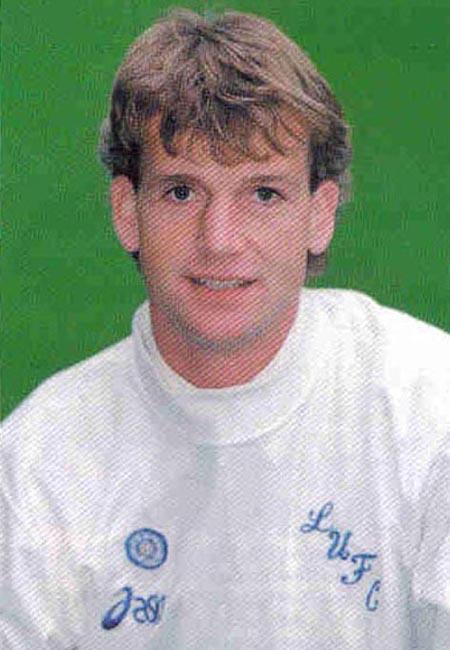 |
 |
 |
 |
 |
 |
 |
 |
 |
 |
 |
Players
Richard Jobson (defender) 1995-98
Richard Jobson was born on 9 May 1963 in Hull At Hull, Jobson flourished: over five seasons he made 221 league appearances,
scoring 17 goals — establishing himself as a strong, athletic defender
with an eye for goal. His performances earned him a move to Oldham Athletic
in August 1990 for a club-record £460,000. Jobson became a key figure
in the Latics’ promotion to the First Division in 1991, featuring in 189
league matches, scoring 10 goals, and playing in an FA Cup semi-final
in 1994. He also won two England B caps in this period. By October 1995, aged 32, Jobson earned a high-profile move to Leeds
United for £1 million under manager Howard Wilkinson. Though it represented
a personal milestone — a return to top-flight football and a local big-club
— his time at Elland Road would ultimately prove frustrating. He made 12 league appearances in his first season (1995/96), scoring
once — a memorable goal in a 1–1 draw at home to Wimbledon in December.
That campaign also featured his standout moment in a famous 3–1 Christmas
Eve victory over bitter rivals Manchester United, a game Jobson later
described as the highlight of his Leeds stint. That result remains a cherished
memory for many supporters . In his second season (1996–97), he added 10 more league appearances,
but the ongoing injury challenges — particularly a knee issue—began to
limit his playing time. Leeds also underwent managerial change—Howard
Wilkinson left; George Graham took charge and brought in younger defenders
like Robert Molenaar, further reducing Jobson’s opportunities. He did
not feature at all in the 1997/98 season, and by March 1998 had been loaned
to Southend United, where he played eight times and scored once, before
Leeds allowed him to leave on a free transfer to Manchester City. Crucially, despite his ambition and professionalism, injuries curtailed
what could have been a more substantial impact at Leeds. Jobson himself
acknowledged the frustration, stating in later interviews that his time
at Leeds was ruined mainly by physical setbacks despite a promising start
and local significance of the move . After joining Manchester City in March 1998, Jobson reunited with former
manager Joe Royle. There, he helped City reach back-to-back promotions—from
Division Two to Division One, then into the Premier League — making around
50 league appearances and scoring four goals over three seasons. Later
in his career, he had short loan spells at Watford and Tranmere Rovers,
finished with permanent moves to Tranmere and then Rochdale, where he
played until retirement in 2003 — making a final league appearance just
six days before his 40th birthday. In total, his professional career spanned
nearly 600 league appearances and 42 goals. Off the pitch, rather than fading into anonymity after retirement, Jobson
transitioned into important football administration roles. In November
2002, while still playing at Rochdale, he succeeded Nick Cusack as chairman
of the Professional Footballers’ Association (PFA), a post he held through
to his retirement and beyond. He later served as a senior executive in
their player management department, shaping support structures for professional
footballers in England. .
A commanding centre-back standing approximately 6 ft 1 in, he began his
professional career at Burton Albion in 1981 before being signed by Watford
in November 1982 by manager Graham Taylor. At Watford he gained limited
league exposure — 28 appearances and four goals — but impressed enough
to earn a move to his hometown club, Hull City, in February 1985 for around
£40,000.
.
A commanding centre-back standing approximately 6 ft 1 in, he began his
professional career at Burton Albion in 1981 before being signed by Watford
in November 1982 by manager Graham Taylor. At Watford he gained limited
league exposure — 28 appearances and four goals — but impressed enough
to earn a move to his hometown club, Hull City, in February 1985 for around
£40,000.